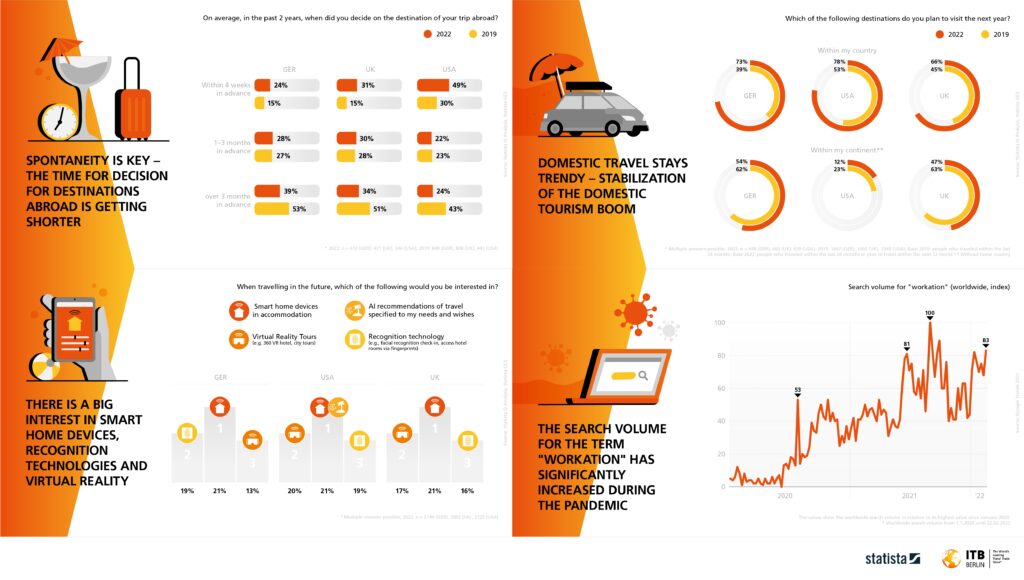ITB BERLIN CONVENTION: IN 2022 THE TOURISM INDUSTRY COULD ACHIEVE 80% OF PRE-PANDEMIC TURNOVER AND EXCEED IT IN 2024
A recovery in travel is on the horizon: 46% tourism growth is possible in 2022, the highest figure in years according to a report presented by ITB Berlin and Statista Q. It confirms also the status taken by domestic tourism, which remains more popular than travelling abroad.
During the first day of ITB Berlin Convention, ITB Berlin and Statista Q took a look at travel in 2022 and the future of the tourism industry. A significant improvement was already noticeable in 2021 with a 36% rise in growth compared with 2020. According to Statista’s Mobility Market Outlook (MMO), the industry achieved in 2021 a global turnover of around €260 billion. This year, the figure will probably exceed €353 billion, up by 46% -the highest growth rate in recent years.
Statista experts point however that a full recovery will not be achieved until 2024. This is the conclusion of Statista’s February 2022 Global Consumer Survey (GCS) which analyses answers of more than 2,000 interviewees.
Travellers want greater flexibility
Since the pandemic began, flexibility has become an absolute ’must’ in the tourism industry. Whereas in 2019 a majority of travellers in Germany took over three months to decide on an international trip, now 28% of tourists take one to three months, and less than 25% need less than four weeks even!
Compared with pre-pandemic levels, trip cancellation insurances have increased by almost 10%, while termination insurances have risen by 20%. The fact that customers want to be flexible is reflected in the use of online booking apps, which has grown by over 40% when compared with 2019.
German tourism destinations are attracting more and more young people
As a result of Covid-19, there has been a sharp rise in domestic tourism. According to DESTATIS, in June 2019 German visitors accounted for 84% of all overnights, while in both June 2020 and 2021, this number rocketed to 94%. While returning foreign tourists will lower this figure, the under-thirties are making a significant impact. This year, more than 38% of all travellers aged under 30 aim to travel in Germany, an increase of almost 25%. Overall, 72% of German travellers are planning a domestic trip over the next 12 months. In 2019 the figure stood at 39%. 12% mention sustainability as the reason for a domestic trip, while 37% say that a German holiday is as exciting as going abroad.

Smart accommodation, AI and recognition technology
More than half of all travellers claim to be interested in new technology on future trips. 21% of tourists from Germany, the USA and UK indicate their interested in smart home devices. Slightly fewer are interested in recognition technology, VR and AI-based personalised travel recommendations. The success of the startup The Hotels Network shows how important personalisation is. According to the business information platform Crunchbase, the company already received more than US$15 million in financing and says it is working with over 12,000 hotels worldwide. With the help of predictive personalisation through its own online channel, The Hotels Network wants to improve services and increase sales.
Workations are the new trend
Work is also a new reason to take holidays besides the usual motivation for travelling like family visits and sightseeing. This is the concept of working from anywhere, the idea of “workation”. Last summer Sundar Pichai, CEO of Google, popularised the concept with a much-publicised email, stating that every employee was entitled to up to four weeks of workation. Since then the global volume of online searches has doubled. As a result a new type of customer has emerged, who with entirely new needs and a behaviour unlike that of business travellers is potentially creating a new market.
What does the war in Ukraine mean for international tourism?
According to UNWTO, in 2019 Ukraine and Russia’s combined expenditure of outbound tourism amounted to around 3.2% of the volume worldwide. Neighbouring Eastern European countries accounted for around 1.8% of the total. In 2019 spending worldwide topped around US$1.5 trillion. In 2019, Ukraine and Russia accounted for a combined 2.6% of a total of 1.5 billion international tourist arrivals, while their neighbours had a share of around 5.3%.
